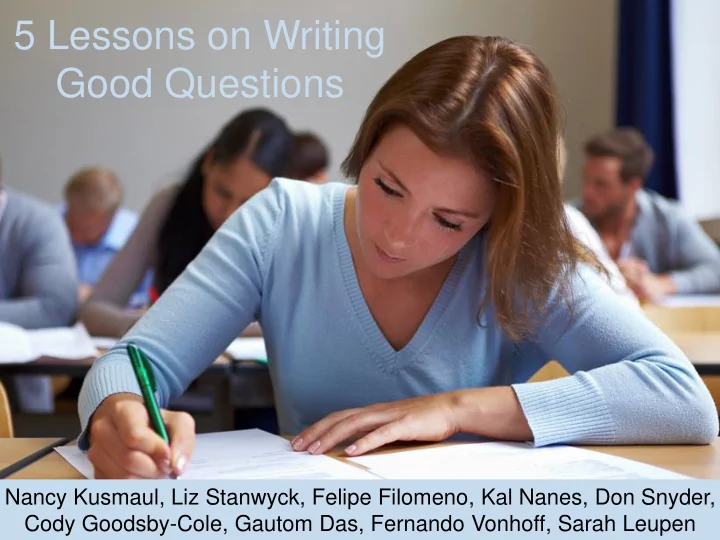

5 Lessons on Writing Good Questions Nancy Kusmaul, Liz Stanwyck, Felipe Filomeno, Kal Nanes, Don Snyder, Cody Goodsby-Cole, Gautom Das, Fernando Vonhoff, Sarah Leupen
1. Target every question you ask students (in class, on assignments, on tests, on homework) to specific learning goals • But questions will be different for in-class versus on exams – Exam questions are more likely to have a right or best answer – In-class questions may be messier, and ‘playground questions’ promote student engagement! • DON’T save your hardest questions for exams!
2. Use questions to target specific misconceptions • But not only on exams! Use these earlier and provide formative feedback. • Goal: get them confused -- confront them with their error or confusion. This brings them into a “learnable moment” where they are really paying attention.
3. True-false questions are usually a bad idea • This includes multiple-true-false questions • T his includes “multiple choice” questions that are actually a series of TF questions, e.g. a) more sodium b) less potassium c) more calcium d) A and B but not C e) A and C but not B f) B and C but not A
4. Give your students more complex questions as the semester goes on • For most of us this means: make sure your questions early in the semester are simple enough! • Don’t give an exam question in a format students have never seen
5. When students are answering questions in groups, consider having the groups make a decision instead of asking an open-ended question Before: 1) What is multi-sectoral multilateralism? How is it different from conventional multilateralism? According to McArthur, why should global problem- solving follow this principle? How does it compare to the approach to global governance proposed by Keohane and Nye? After: 1) According to J. W. McArthur, why should global problem-solving be multi-sectoral and multilateral? a) National governments cannot solve global problems in isolation from each other. b) Global problems are complex, multi-faceted and inter-related. c) Global leaders are tackling too many problems at once. d) Poor countries are suffering the most from on-going global crises. 2) R. Kehoane and J. Nye proposed their own approach to global governance, which they called networked minimalism. After watching the video on the Sustainable Palm Oil Round Table, identify characteristics of this governance process that match networked minimalism and those that match multi-sectoral multilateralism.
5. When students are answering questions in groups, consider having the groups make a decision instead of asking an open-ended question Before: 1) What is multi-sectoral multilateralism? How is it different from conventional multilateralism? According to McArthur, why should global problem- solving follow this principle? How does it compare to the approach to global governance proposed by Keohane and Nye? After: 1) According to J. W. McArthur, why should global problem-solving be multi-sectoral and multilateral? a) National governments cannot solve global problems in isolation from each other. b) Global problems are complex, multi-faceted and inter-related. c) Global leaders are tackling too many problems at once. d) Poor countries are suffering the most from on-going global crises. 2) R. Kehoane and J. Nye proposed their own approach to global governance, which they called networked minimalism. After watching the video on the Sustainable Palm Oil Round Table, identify characteristics of this governance process that match networked minimalism and those that match multi-sectoral multilateralism. ! This doesn’t mean make the question “simpler” !
Two more tidbits … • Ask one or two questions on every exam or other assessment that will challenge even the very best students
Two more tidbits … • Ask one or two questions on every exam or other assessment that will challenge even the very best students • Can we get our students to ask better questions by using good ones ourselves?
Recommend
More recommend